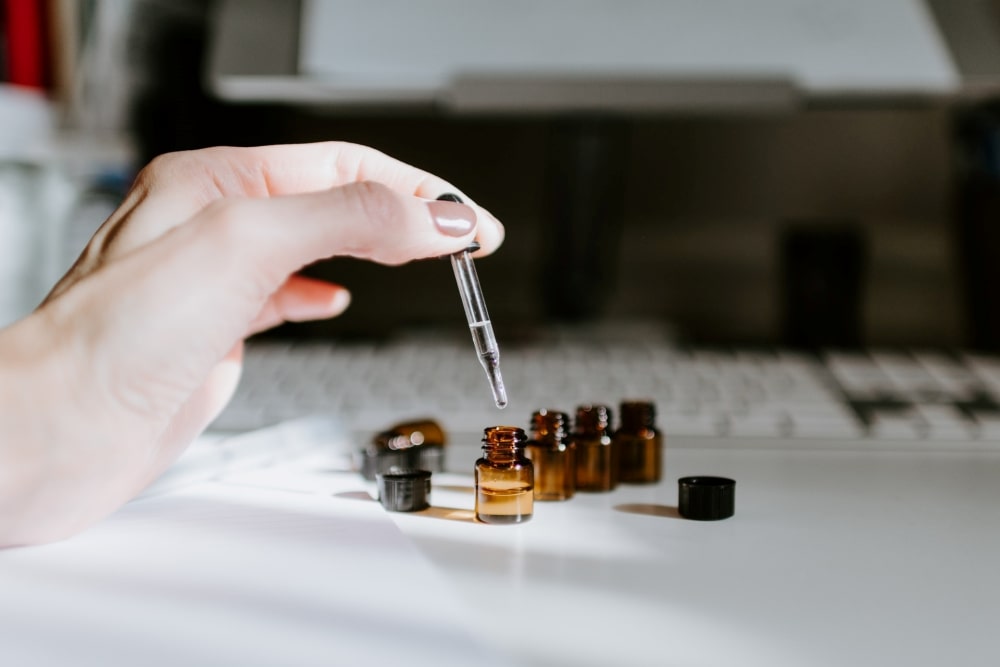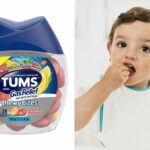Essential oils have grown in popularity over the last few decades as we look for a more natural treatment for common ailments. But are they safe to use on babies and young children?
We take a look at those that are safe and those that are not along with some common ailments that they can help to treat such as colic, colds, diaper rash, and congestion.
In this article
What Are Essential Oils?
Essential oils are compounds that are extracted from plants. These oils often capture the scent or flavor of the plant and these unique aromas give each essential oil its characteristic scent or taste.
Essential oils are collected through distillation or cold pressing from a variety of plant parts: shrubs, flowers, trees, roots, bushes, fruit, rinds, resins, and herbs.
Once the chemicals have been extracted, they are then combined with a carrier oil to create a ready to use product.
Are Essential Oils Safe For Babies?
Generally, they are not recommended for use around babies as they do come with safety risks. Toxic exposure to essential oils has increased hugely over the last few years.
View in gallery
There are a few reasons why essential oils can be dangerous for babies:
Potency
Some essential oils are just too potent to be used around babies. This means that the concentrated nature of their chemical compounds is too strong.
If these are used incorrectly they could pose a high risk to babies and could possibly cause adverse reactions including burns, rashes, and breathing issues.
Phototoxicity which is a chemically induced skin irritation can occur in less potent oils such as citrus oils.
Ingestion of essential oil
There is a huge amount of inaccurate information surrounding the use of essential oils. You should never ingest essential oils or add them to food unless you are under the care of a qualified practitioner.
Overuse
Overuse of essential oils can be dangerous. They should be considered in the same way as any other medication or remedy and should therefore be used with caution, preferably under the guidance of a qualified practitioner.
Incorrect use
There are some things that you should not be doing with essential oils. These include using undiluted oils on children’s skin and running a diffuser for hours at a time. The optimal running time is 15 – 30 minutes.
Oil purity and quality
The essential oil industry is not very well regulated. This means that there are no rules that state what an essential oil company has to disclose with regard to its products.
This does mean that a wide range of chemicals and additives could possibly be added to the essential oils.
When Can You Use Essential Oils With Babies?
View in gallery
The very earliest that you should really expose your bay to essential oils is around 6 months old.
This includes both topical or aromatic exposure. At around 6 months of age, you may consider running a diffuser sparingly and only when absolutely essential.
Essential oils are all the fashion at the moment and this can lead to parents overusing them and this can lead to systematic sensitization. This can result in the essential oils losing their effectiveness.
Before turning to essential oils to treat your baby’s common ailments such as teething and colic it is always worth trying a slightly less aggressive treatment.
This could include offering a teething toy to your baby who is teething or giving your baby probiotics to help with any digestive issues.
You always need to consider the advantages and disadvantages of using essential oils, especially at a very young age.
When you do begin to use essential oils around your baby it is always best to introduce one new oil at a time.
Then you will want to closely monitor your children for a few hours to ensure that they do not suffer any adverse reactions such as skin rash, chemical burns, nausea, vomiting, headache, lethargy, or respiratory distress.
You will need to seek medical attention if your child suffers from any of these.
Essential Oils That Are Not Safe For Babies
These are some of the essential oils that are not safe for use with or around babies and young children.
There will be some oils on this list that are not safe for young children but are suitable for older children. But you will often find child-friendly alternatives to the oils on this list.
View in gallery
Essential oils that are not safe for babies:
- Anise
- Aniseed
- Basil (Lemon)
- Bay Laurel
- Benzoin
- Birch
- Black Seed
- Cajeput
- Cardamon
- Cassia
- Cinnamon Bark
- Cinnamon Leaf
- Clove bud
- Cornmint
- Fennel
- Garlic
- Hyssop
- Lemon Balm
- Lemon Verbena
- Lemongrass
- Marjoram (Spanish)
- May Chang (Litsea Cubeba)
- Myrtle (Lemon and Honey)
- Niaouli
- Oregano
- Peppermint
- Ravinsara
- Rosemary
- Sage
- Lemon Scented Tea Tree
- Thyme
- Turmeric
- Turpentine
- Wintergreen
This is by no means an extensive list and if you have any concerns about the safety of using a specific essential oil around your baby or young child, it is best to check with a trained professional.
Essential Oils That Are Safe For Young Children
Generally the best approach is to not use essential oils around children under the age of 2. Yet some of these essential oils can be used on children as young as 6 months.
It is advised that these are used sparingly and only when there are exceptional circumstances. Essential oils that are safe for babies:
- Bergamot
- Blue Tansy
- Cedarwood
- Clary Sage
- Copaiba
- Cypress
- Frankincense
- German Chamomile
- Geranium
- Ginger
- Grapefruit
- Helichrysum
- Lavender
- Lemon
- Mandarin
- Marjoram
- Neroli
- Orange
- Palmarosa
- Patchouli
- Petitgrain
- Roman Chamomile
- Sandalwood
- Spearmint
- Tangerine
- Tea Tree
- Vetiver
Essential Oils For Common Baby Ailments
For Baby Colds and Congestion
Eucalyptus
Many of the most commonly found chest rubs on the market contain eucalyptus. It has an uplifting scent as well as some great benefits such as its antimicrobial effect to ward of illness.
- Pure and natural, steam distilled eucalyptus essential oil; non-toxin, no additives, unfiltered and undiluted with no fillers
- Extracted from the leaves using a chemical-free, double distillation process to ensure the highest level of purity
Prices pulled from the Amazon Product Advertising API on:
Product prices and availability are accurate as of the date/time indicated and are subject to change. Any price and availability information displayed on [relevant Amazon Site(s), as applicable] at the time of purchase will apply to the purchase of this product.
For Teething
Chamomile and Lavender
Teething can be a stressful and painful time for your baby. But there are ways that you can help them to relax and alleviate some of the pain from teething.
You could try a gentle massage of the jawline, a blend of chamomile or lavender, and a carrier oil along the jawline to help to ease their pain.
- Safety Warning: For external use only. Other than aromatherapy, dilute with a carrier oil. For topical use, rub a very small amount on the inside of your elbow area to test for any allergic reaction before use, discontinue if irritation occurs; Avoid contact with eyes, keep out of the reach of children. If pregnant, consult with your health care provider before use
Prices pulled from the Amazon Product Advertising API on:
Product prices and availability are accurate as of the date/time indicated and are subject to change. Any price and availability information displayed on [relevant Amazon Site(s), as applicable] at the time of purchase will apply to the purchase of this product.
For Insomnia
Lavender and Citrus Oil
If your little one is suffering from a sleepless night then so are you. You could try a calming massage with lavender essential oil, mandarin, or chamomile.
Essential Oils For Colic
Roman Chamomile and Lavender
When your baby is suffering from colic it can make them fussy and cause them pain. But chamomile and lavender can help to reduce this pain
- GENTLE SLEEP TIME REMEDY: Diffuse a few drops of Chamomile Roman in an aromatherapy diffuser while relaxing at night to soothe the mind and body. The sweet, green, herbaceous apple-like scent will have you drifting off into a deep slumber.
Prices pulled from the Amazon Product Advertising API on:
Product prices and availability are accurate as of the date/time indicated and are subject to change. Any price and availability information displayed on [relevant Amazon Site(s), as applicable] at the time of purchase will apply to the purchase of this product.
For Diaper Rash
Melaleuca
Also known as tea tree oil. This is a natural antimicrobial that can soothe diaper rashes. Tea tree oil is quite strong and so should not be used on babies under 6 months of age, and it should always be tested on a small area of skin for possible irritation.
For Bug Bites
Lavender
Insect bites are painful and for a baby, they can be even worse causing irritation, and itchiness. Lavender when combined with a carrier oil can be topically applied to relieve the itch and redness.
Safety Tips
Although essential oils come from a natural source there are still safety guidelines that should be followed.
Use Sparingly
Parents should refrain from using essential oils as a remedy for every ailment. It is advised to only use them when absolutely necessary and even then use them sparingly.
Recommended dosage
Essential oils are extremely potent and you should only use the correct dosage. The correct dosage would need to be prescribed by a qualified practitioner.
Safety guidelines
If a certain oil is not safe to use around your baby then do not do so.
Keep out of reach of children
Never let children play with essential oil bottles. If swallowed essential oils can be hazardous.
Watch your child carefully
After administering a new essential oil, monitor your child closely for any reactions or irritations.
Products that contain essential oils
There is a vast range of products available that now contain essential oils, but this does not mean that they are safe for children. It is going to be best to stick those products that are designed for use by children and babies.
View in gallery
How To Use Essential Oils
There are a few different ways in which you can use essential oils safely around children. Once you have decided on an oil that is safe for use around babies and young children, you can introduce it using one of these methods.
Diffusing
Diffusing is a great way to use essential oils. You can use a diffuser such as the Cool mist Humidifier. It is recommended that you add 4-8 drops to water and diffuse for around 15-30 minutes, then turn off the diffuser for at least 15-30 minutes.
Topically
If you are dealing with skin conditions or sore muscles then topical use is a really helpful way to use the essential oils. Undiluted essential oils should never be applied to the skin.
How to dilute essential oils:
| Percentage | Equivalent drops | |
| Babies and young children | 0.5 – 1% | 1 drop per 1-2 tsp of carrier oil. |
| Age 5-12 | 1 – 2% | 1 – 2 drops per tsp of carrier oil. |
| Healthy adults | 2 – 5% | 2 – 5 drops per tsp of carrier oil. |
Inhalation
This is a great alternative if you are somewhere that you can not diffuse the essential oil. You can just put a single drop on your sleeve or a handkerchief. You could also add a few drops to cotton wool balls.
Are Hydrosols Safe For Babies?
A hydrosol is a pure and natural water produced during the steam distillation of plants. They are produced during the same process that also extracts essential oils.
These are less likely to cause a reaction because they are essentially a less potent version of the essential oil. Hydrosols can be used undiluted because they are a milder version of the essential oil.
Although these pose less of a risk of causing a reaction it is still advised that you follow the same guidelines as those for essential oils when it comes to their use around babies and young children.
The Final Thought
Essential oils can certainly offer an alternative to traditional medicine but they would also be treated with the same respect as those traditional medications.
Purely because they are made from natural elements does not mean that they are automatically safe to use especially on young babies and children.
It is advised essential oils are used sparingly and only when other less aggressive treatments have been exhausted for common ailments such as teething and colic.
Personally, I would seek the advice of a professional before using any essential oils on my children. They will be able to offer you the correct advice on which oils to use and the dosage required.






